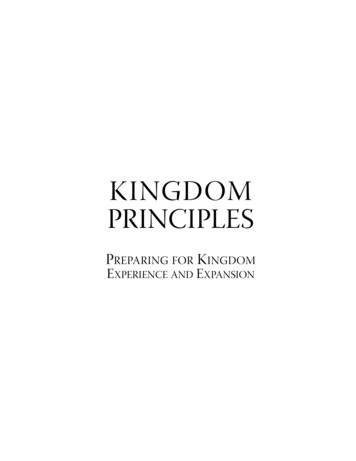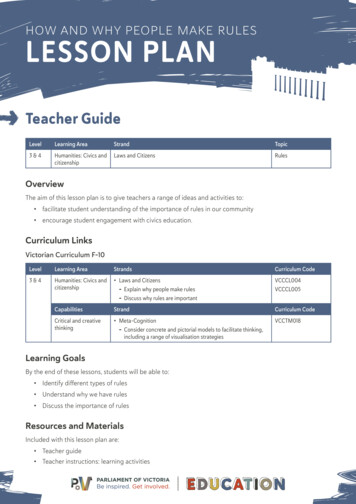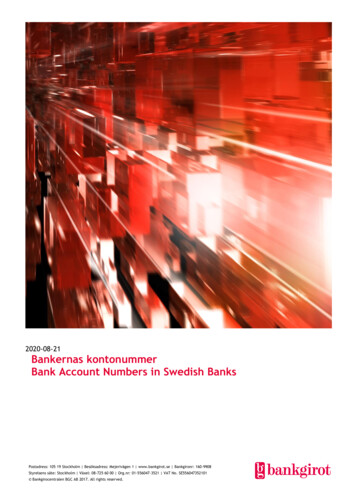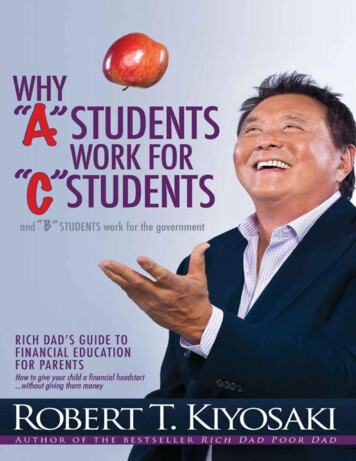
Transcription
IntroductionAwaken Your Child’s Financial Genius"Everybody is a genius.But if you judge a fish by its ability to climb a tree, it will live its whole life believing that itis stupid."–Albert EinsteinWhenever I think about writing a new book I ask myself: Why am I writing this book?For me, the answer has always been simple, and always the same. I have always wondered whymoney is not a subject taught in school. Day after day, our teachers drummed this into our heads:"Go to school to get a job.If you don’t go to school, you won’t get a good job."Why Go to School?This caused me to ask my teachers, "Isn’t the reason for getting a job to make money? If money is theobjective for getting a job, why not get right to the point and just teach us about money?" My questionwas never answered.The Emperor Has No ClothesThe Emperor’s New Clothes is a Danish fairy tale written by Hans Christian Andersen, published in1837.
The Plot:Once upon a time, there lived an emperor who cared only about his clothes and aboutshowing them off. One day two con men came to him and said that they could make himthe finest suit of clothes from the most beautiful cloth. This cloth, they said, was veryspecial. The cloth was invisible to the stupid and the low-born.Being a bit nervous about whether he himself would be able to see the cloth the emperorfirst sent two of his trusted advisors to see this special material. There was, of course,no cloth at all, but neither would admit that they could not see it and so they praised it.As word of this special cloth spread, all the townspeople were now interested to learnhow stupid their neighbors were.The emperor then allowed himself to be dressed by the con men in his special new suit,made of this special cloth, for the procession through town. Although he knew he wasnaked, he never admitted it for fear that he was too unfit and stupid to see that he waswearing nothing. He too was afraid that the townspeople would think that he was stupid.Of course, all the townspeople wildly praised the magnificent clothes of the emperor,themselves afraid to admit that they could not see the clothes, until a small child said:"But he has nothing on!"The child’s parents gasped and attempted to silence the child, but the child would not besilenced. As he twisted and turned, pulling his parents hands from his mouth, hecontinued to say, "The emperor is naked!" Soon, a few of his classmates were gigglingand joined in."After awhile adults joined their children and began to whisper, "The kids are right! Theold guy has nothing on. He’s a fool and he expects us to be foolish with him."What Americans Really WantIn his 2009 book, What Americans Really Want Really, Dr. Frank Luntz, a respected pollster whomeasures the heartbeat of America, asked this survey question:If you had to choose, would you prefer to be a business owner or CEO of a Fortune 500 Company?Those questioned responded with the following:80% The owner of a business that employs 100 or more people.14% The CEO of a Fortune 500 Company that employs more than 10,000 people.6% Don’t know/refused to answer.In other words, Americans today want to be entrepreneurs. The problem is that our school system istraining our kids to be employees.This is why schoolteachers and many parents continue to say, "Go to school to get a good, highpaying job." Few parents or teachers are saying, "Go to school to learn to create good, high-payingjobs."
There is a tremendous difference between the skill sets of an employee and the skill sets of anentrepreneur. The skills required to be an entrepreneur are not taught in most schools.Dr. Luntz found that over 70% of full-time, corporate employees are considering or have consideredstarting their own businesses. Many people dream of becoming entrepreneurs, but few will take theleap of faith. The lack of financial education is the primary reason why most people will remainemployees. Without a financial education, most employees are terrified of losing their job, not havinga steady paycheck, or simply failing.Financial education and the transformation it delivers are essential for entrepreneurs.Forget MBAsDr. Luntz goes on to state:"So how to equip a generation of Americans for success in entrepreneurship? Forgetabout MBAs. Most business schools teach you how to be successful in a big corporationrather than start your own company. But starting something from scratch and nurturingit as it grows is where our country has been at its strongest and most innovative."Killing the American DreamAmericans have always wanted to be entrepreneurs. People immigrated to America—some enduringunimaginable hardships—attracted by the promise of the American Dream. Millions left theoppression of the kings and queens of Europe and the tyranny of communist dictators in other parts ofthe world, just for a shot at the American Dream. Their American Dream.The American Dream is just as Dr. Luntz describes: "Starting something from scratch and nurturingit as it grows is where our country has been at its strongest and most innovative."Our schools seem to have forgotten about the American Dream. The problem is that our educationalsystem trains students to be "A" students—academics—or "B" students—bureaucrats. Our schoolsdo not train our young people to be "C" students: capitalists. Furthermore, it’s these "C" studentswho so often follow an entrepreneurial path, carrying the torch of capitalism and creating new jobs.Ask entrepreneurs today and many will tell you that bureaucracies are actively destroying theentrepreneurial spirit of capitalism.They will also say many young graduates do not have the skills required for today’s workenvironment. In fact, many have a "bad attitude" towards capitalists.Hatred of CapitalistsIn 2008, The Kaufman Foundation, a leading entrepreneurial think tank in America, commissioned Dr.Luntz to find out what Americans thought about capitalism. His survey found:"It’s hard to tell which has become the stronger emotion: respect for entrepreneurs or hatred towardCEOs."In November of 2012, Hostess Brands, the maker of iconic baked goods including Twinkies andWonder Bread, shut its doors and filed for bankruptcy protection. The CEO of Hostess claimed thecompany forced to shut down due to union demands for higher wages and benefits.Making matters worse, it’s not just the 18,000 workers who were affected. When the companyclosed, 18,000 families felt the impact as well. If there is an average of four people in a family, thenumber of lives impacted jumps to 72,000. This ripple effect spreads from each family, affectingschools and businesses such as dentists, grocery stores, dry cleaners, retailers, auto repair shops,
even churches, and the rest of the community.It was later disclosed that the CEO of Hostess Brands and his team of merry men and women paidthemselves millions in severance bonuses.Small wonder that Americans now hate CEOs. Many are graduates of our finest business schools andit begs the question: Is this what our business schools teach?Unfortunately, it is.Many of our brightest students go on to business schools, graduating with MBAs, and begin to climbthe corporate ladder as employees, not entrepreneurs. The most ambitious become CEOs andexecutives of big business.CEOs Are Not CapitalistsLater in this book I’ll write about the fact that most CEOs are not capitalists. Most CEOs andcorporate executives fall into a category called managerial capitalists, employees who work forreal entrepreneurs—entrepreneurs like Steve Jobs, Thomas Edison, Walt Disney, Mark Zuckerberg,and others—but who have no personal financial stake or investment in the business.Interestingly enough, Edison and Disney did not complete high school. Jobs and Zuckerberg nevergraduated college.Most "A" students, graduates from our finest schools, become "managerial capitalists"—employees—rather than "true capitalists." It is these managerial capitalists, typically "A" students who landhigh-paying jobs, who give capitalism a bad name.Managerial Capitalists Are ScaryIn his book, What Americans Really Want Really, Dr. Luntz states:."in today’s world, ‘capitalists’ frighten people and ‘capitalism’ is short hand forCEOs taking tens of millions of dollars on the same day their pens wipe out 10,000jobs."Tragically, many people do not understand the difference between managerial capitalists and truecapitalists.Just think of the CEOs who were paid huge bonuses, while millions lost their jobs, their homes, andtheir retirement nest eggs. Is this what our schools teach our best and brightest young people?Again, the answer is "Yes." Our schools give capitalism a bad name, because what they teach is nottrue capitalism.Unfortunately, most parents are proud when little Johnny or Susie graduates at the top of their classand is hired by a Fortune 500 firm earning a six-figure salary at the age of 26 and begins climbing theladder. Most parents do not care that their child has been trained to be a managerial capitalist, ratherthan a true capitalist, an entrepreneur like Steve Jobs or Thomas Edison. Today we have a globalcrisis because:Schools are more focused on greed not generosity.Schools are about "How much money can I make?" versus "How much money can I make servingothers?"Schools are about finding a high-paying job rather than creating high-paying jobs.
Schools are about climbing the corporate ladder rather than how to create companies andcorporate ladders.Schools are about job security rather than financial freedom, which is why most employees livein fear of "losing their job."Schools teach little to nothing about money, which is why millions of people now believe inentitlement programs, like Social Security and Medicare in the United States. And millions takejobs in government or military service, not to serve their country but for the retirement andmedical benefits.The New DepressionIn 2007, the world awoke to the New Depression. There are many reasons for this modern-daydepression. A few of them are:1. Governments printing money.2. Trillions of dollars of debt, both personal and governmental.3. Underfunded entitlement programs such as Social Security and Medicare in the United States and agrowing entitlement mentality all over the world.4. High youth unemployment and student loan debt that can damage a student’s "credit worthiness."5. Globalization, including workers in emerging countries working for less and causing jobs to beexported, leading to lower wages at home.These are the problems your child will face.The Emperor Has No Clothes!So the question parents should ask is: Are schools preparing my child for the real world?The answer is "No."And so the plot thickens As Hans Christian Anderson warned us in 1837 in his tale of the Emperor:Soon the whisper spread from person to person until everyone in the crowd beganshouting, "The emperor has no clothes."The emperor heard it, of course, and although he knew they were correct, that he wasstark naked in front of the town, he held his head high and finished the procession.It seems to me that the school system cannot admit they are not preparing children for the real world.That would be admitting to failure—and we all know what failure means in the school system.It means the school thinks your child is not smart—but it really only means that your child isn’t doingwhat the school tells them to do.Without financial education, your child will leave school naked. He or she might be an "A" student but they will be parading through life like the emperor. As the tale goes:"Although he knew he was naked, he never admitted it for fear that he was too unfit andstupid to see that he was wearing nothing. He too was afraid that the townspeople wouldthink that he was stupid."Since our schools will never admit that they are not preparing your child for the realworld, it is up to parents—a child’s first and most important teachers—to give children
the financial education required for the real world, a world that runs on money.
Part OneARE SCHOOLS PREPARING YOUR CHILD FOR THE REAL WORLD?Modern-Day Version ofThe Adventures of Tom SawyerMark Twain, 1876
Part OneIntroductionSchool is a great experience for some children. For others, school is the worst experience of theirlives.Every child has a genius. Unfortunately, their genius may not be recognized by the educational system.Their genius may even be crushed.Thomas Edison, one of the great geniuses of modern times, was labeled "addled" by his first teacher.Addled means "mixed up or confused." He never finished school, and instead became an inventor andan entrepreneur. The company he founded, known today as General Electric, creates products thathave changed the world. A few of Edison’s early projects were the phonograph, the motion picturecamera, and the electric light bulb.Albert Einstein also failed to impress his teachers. From elementary school through college, histeachers thought he was lazy, sloppy, and insubordinate. Most of his teachers said, "He will notamount to anything." Yet Einstein became one of the most influential scientists in history.Genius is an acronym for "Geni-in-us"—the genie or magician in each of us.All parents have met the genius in their child. Most parents know that a child’s true genius is found intheir dreams. We see glimpses of it from an early age the ideas and things that delight them,fascinate them, and challenge them.Protecting and nurturing the genius in your child is a parent’s most important job.This book is written as a guide to help you develop child’s financial genius.
Part One Chapter OneLesson #1:An Educational CrisisThe 2012 U.S. Presidential campaign between President Barack Obama and former MassachusettsGovernor Mitt Romney brought to light the difference in their levels of financial education.While both are highly educated men, one candidate was financially sophisticated the other less so.Obama vs. RomneyDuring the campaign, President Obama disclosed that he paid 20.5% in taxes on approximately 3million in income. Mitt Romney paid 14% on 21 million in income.This gap in income and taxes angered many voters, especially the poor, middle class, and youngervoters. Rather than ask why and how Romney made more money and paid a lower percentage intaxes, many voters just got angry. Most failed to ask, "How did Romney do that?" Or "How did heearn 21 million and pay 14% in taxes?" Or "How is that legal?" Or "Who is smarter when it comesto money President Obama or candidate Romney?"In his second term as President, Mr. Obama seems determined to and already has raised taxes on therich—rather than teach kids about money and capitalism, which is how and why the rich get rich andstay rich and often pay less in taxes. Rather than teach kids to fish, it seems President Obama prefersto give kids fish.This book is about teaching kids to fish.What Does It Take to Become Rich?Many people believe the rich are crooks, and some are. Yet there are far more rich people who arehonest, hard working people and are not crooks. They achieved the American Dream the oldfashioned way—through education, hard work, budgeting wisely, building businesses, creating jobs,and paying their taxes as little as, legally, possible. They also acquired this wealth by studyingsubjects not taught in our schools.This difference in education is reflected in President Obama and Mitt Romney.Both men went to great schools. President Obama is a graduate of Columbia University and HarvardLaw School. Mitt Romney is a graduate of Harvard Business School and Harvard Law School.The primary difference between President Obama and Romney is that President came from a poorfamily and the former governor comes from a rich family.Their story is similar to the ones found in Rich Dad Poor Dad.The lesson of financial education is taught at home not in school.This book is written for parents who want to give their child a financial headstart, at home, studyingsubjects most students—even "A" students—never study.Making the CaseThe "business" of education is one of the biggest industries in the world, impacting the lives of nearly
every person on the planet in one way or another. In the United States public elementary andsecondary schools alone—which employ 3.3 million full time teachers— 571 billion will be spentfor the 2012-2013 school year. That’s only in the United States, a country where approximately fivemillion students entered high school in the 2010-2011 school year. Globally that number growsexponentially. I often ask myself how many of these kids finished high school and how manydropped out? How many went on to college or university and how many actually graduated? Thestaggering statistics on the college loan debt they’re saddled with have made headlines around theworld. And how many went on for an advanced degree—at even greater cost—in the hope ofproportionately higher salaries when they joined the global workforce?Not only are hundreds of billions of dollars spent on elementary through university education, but themilitary also spends billions of dollars to train young men and women to serve their country.Corporate training of employees is another billion-dollar industry as are the tradeschools that teachfuture technicians to repair and maintain our cars, refrigerators, electrical systems, and computers.But financial education, at least in the established, formal arenas of school systems and curricula, islargely ignored. I’ve asked myself again and again: Why is that?Could the lack of financial education be one of the reasons behind our financial crisis?How much of the subprime mortgage crash was caused by a lack of financial education?How many of the millions of families who lost their homes lost them, in part, due to a lack offinancial education?Could the lack of financial education be the reason why so many people are dependent upongovernment programs like Social Security, Medicare, military and public service pensions—pensions which are bankrupting cities, states, and entire countries?Is the United States—like countries around the world—heading for bankruptcy because millionsof Americans need the government to take care of them socially, medically, and financially?Is our escalating national debt a reflection of our corporate and political leaders’ lack offinancial education?Is the United States decaying into the same economic demise countries such as Greece, Italy,France, Japan, England, and Spain are facing?Welfare for the RichWe all know there are welfare programs for the poor, but what about welfare for the rich?Why do our leaders—the President, Congress, and other political bureaucrats—vote themselvesgiant pensions and generous benefit packages while the number of families on public assistancegoes up? Are our leaders as financially needy as those who rely on the government to meet theirmost basic needs?What would happen if we had leaders who knew how to create wealth rather than just knowinghow to spend other people’s (the taxpayers’) money?Why do CEOs grant themselves massive pay increases, stock options, and perks at the same timethey lay off workers? Are CEOs greedy due to a lack of financial education, or did they go to
school to learn to be greedy?Did the bankers who lost billions have an adequate financial education?Why were millions of employees laid off, and thousands of small businesses closed, while thebankers who caused the crash were paid multi-million dollar bonuses?Why do teachers’ unions and government bureaucrats determine what our children learn? Whatabout asking the kids and their parents what they need to learn?Why are many of America’s highest paid workers no longer from the private sector? Why are somany well-paid employees, so called public servants, some of the highest paid workers inAmerica today? Why are firefighters and police officers retiring with millions in lifetimebenefits? What has happened to government service?Who caused this financial crisis?Today’s financial crises were not caused by poor, uneducated people. Behind the chaos are some ofthe most well-educated people in the world, people such as Federal Reserve Chairman BenBernanke, a former Stanford and Princeton professor, a student of the Great Depression, but,unfortunately, someone without much financial education or real life business experience.This book is about education. But not the education taught in our schools.An Educational CrisisWe are not in a financial crisis. We are in an educational crisis. This crisis begins when our childrenenter school, spending years—sometimes decades—learning nothing about money and being taught bypeople who know little about money.For some reason, our schools have a quasi-religious view about money.Schools seems to believe:"For the love of money is the root of all evil."–Timothy 6:10Schools ignore the passage that reads:"My people perish from a lack of knowledge."–Hosea 4:6People are perishing economically due to a lack of financial education in our schools.Lao Tzu, the Chinese founder of Taoism in the 5th Century BC, stated:"If you give a man a fish, you feed him for a day.If you teach a man to fish you feed him for a lifetime."Unfortunately, rather than teach people to fish, we are teaching kids the Robin Hood philosophy ofeconomics:"Take from the rich and give to the poor."That’s also known as socialism.Ultimately, all that this generosity does is create more poor people. On November 2, 2012 a headlinein The Weekly Standard stated:"Food stamp rolls grow 75 times faster than jobs."As expected, the Republicans blame President Obama for this crisis and the Democrats state that
Republicans are to blame.This book is not about politics. It is about education, and about how the lack of financial education isthe true cause of financial crisis.Lag TimesMost schoolteachers are great people. The problem is that most teachers, and parents, are products ofthe same educational system.Many teachers are frustrated. Many teachers are pushing for change. Unfortunately, the educationindustry seems to be an industry that has one of the slowest rates of change.Different industries have different lag times. One definition of lag time is the time delay between anew idea being proposed and its adoption. For example, I’ve been told that in the world oftechnology, lag time is around 18 months, the time between a new idea and that idea taking the form ofa new product. That’s why competition can become so fierce in bringing a new product to market and why new companies soon find themselves out of business because someone else can deliver newproducts or technology faster, better and cheaper.Lag times in the Agrarian Age were measured in hundreds of years. Lag times in the Industrial Agewere measured in fifty-year increments. Lag time in the Information Age is measured in half-years.I’ve heard that the auto industry has a lag time of 25 years. This means the new ideas you see on carstoday were conceived 25 years ago ideas such as hybrid cars. And that the business of governmenthas a lag time of approximately 35 years.The reason many teachers and parents are frustrated is because, among all industry sectors, theeducational industry has the second-longest lag time—50 years.The only slower industry is the construction industry, with a lag time of 60 years.Notice that the automobile, government, construction, and educational sectors all have strong laborunions and labor unions are products of the Industrial Age.The Future of EducationThe lag time in education means that children starting school today will be grandparents before theeducational system adopts the changes this book offers.By teaching your kids the lessons in this book, you are giving your child a financial headstart. If lagtimes hold, it will take until the year 2065 before the ideas in this book enter most classrooms. I don’tbelieve we can afford to wait.This book is written for parents, parents who know that it’s up to them—not the school system—toprepare their child for the real world. And that world is a fast-paced, ever-changing, Information-Ageworld a world unlike any of us have ever experienced.This book is also written for parents who know their children face larger financial challenges, thefinancial garbage heaps previous generations have left behind.This book is written for parents who want to understand why President Obama earns 3 million andpays 20.5% in taxes while Mitt Romney earns 21 million and pays 14%.Once a parent knows and understands the differences in what the two men know, they can pass thatknowledge on to their children.My Story
I have been an advocate for financial education for most of my adult life.In 1973, I returned home to Hawaii from the Vietnam War and found my dad, the man I call my poordad, unemployed. He had been the Superintendent of Education for the State of Hawaii. His problemsbegan when he ran for Lt. Governor as a Republican against his boss, a Democrat. In losing theelection, he also lost his job.My dad committed professional suicide by running for Lt. Governor. He risked his "job security"because he was a man of principle. Once he reached the top of the school system’s ladder, as head ofthe Department of Education, he was outraged at the corruption he found in Hawaii’s government, agovernment Forbes magazine has since called "The People’s Republic of Hawaii." That same articlestated, "The state taxes everything that moves. Fidel Castro would feel right at home here."President Obama grew up in Hawaii. He is the first U.S. President from Hawaii. The Forbes articlemay explain why the President has the views he has on government, business, and taxes.The End of EmpiresI am not a Republican or a Democrat. And I do not blame President Obama for the crisis we face.This crisis has been brewing for decades and similar crises have occurred throughout history.Financial ignorance and political corruption have brought down empires for centuries. The samefinancial ignorance and corruption threatens to bring down America.Military-Industrial ComplexOn January 17, 1961, President Dwight Eisenhower gave the nation a dire warning aboutwhat he described as a threat to democratic government. He called it the military-industrialcomplex, a formidable union of defense contractors and the armed forces. Eisenhower, aretired five-star WWII Army general who led the allies on D-Day, made the remarks in hisfarewell speech from the White House.Economics of WarEmpires also end when empires fight too many wars in far away places. In doing that America isproving we’ve failed to learn from history.While in junior high school, I listened to President Eisenhower’s warning to the nation about thethreat of the "military-industrial complex." I was in my early teens, and his warning meant little to me.Returning from Vietnam in 1973, I understood the President’s warning. We were not fighting for thefreedom of the Vietnamese people. We were fighting for money. We had been lied to by the elites.We had no business fighting in Vietnam, apart from the issue that war is big business. When I returnedfrom Vietnam, I knew it was time to stop blindly following orders. I knew it was time to start thinkingfor myself.I do not criticize my fellow sailors and soldiers. Most of the young men and women I met in theservice were great people dedicated to their country. Our problem was that we were fighting wars tomake the military-industrial complex richer. Anytime the military-industrial complex needs moremoney, they simply start another war.We are making the same mistakes, in my opinion, when it comes to printing money.
The Roman Empire crumbled when the Romans began destroying their own money, fighting wars infar away lands, and raising taxes on its workers.The United States is repeating the mistakes of the past, proving the old saying:"Those who fail to learn from history are doomed to repeat it."Studying Subjects "A" Students Don’t StudyIn 1973, I informed my dad I was leaving the military service. He was disappointed because hewanted me to stay in the military for the retirement and medical benefits. Counting my time at themilitary academy, I had 10 years accrued toward retirement. I only had 10 more to go.When I nixed that idea, my poor dad suggested I fly for the airlines, as many of my fellow Marinepilots were doing. When I told him I was through flying, he finally suggested I go back to school, getmy Masters Degree, possibly my PhD, and climb the corporate ladder.I loved my dad dearly, but he was suggesting I do what he had done, follow in his footsteps proving, once again, that we repeat mistakes if we do not learn from them.And while I loved my dad, I did not want to make the same mistakes he had made.If I had followed my poor dad’s advice, I might be like him today a highly educated but poor 60 year-old, hoping my savings, pension, Social Security, and Medicare would take care of me.In 1973, I decided to follow in my rich dad’s footsteps. I began by studying subjects my poor dad hadnever studied. This book is about the subjects I studied and the courses most people do not study,including "A" students. Because there is a big pay-off for studying subjects "A" students do not study.In 1997, the book Rich Dad Poor Dad was self-published because every publisher we offered it toturned it down. As you might expect, most publishers are "A" students, like my poor dad. Mostpublishers me sent rejection letters stating, "We are not interested in your book at this time." A fewmore honest publishers stated, "You do not know what you are writing about." Or, "Your ideas areridiculous.""Your House Is Not an Asset"Rich Dad Poor Dad was harshly criticized due to statements such as "Your house is not an asset."Ten years later, in 2007, millions of homeowners all over the world found out the hard way that theirhome was not an asset. As property values plummeted all over the world, millions were pushed intobankruptcy expe
system trains students to be "A" students—academics—or "B" students—bureaucrats. Our schools do not train our young people to be "C" students: capitalists. Furthermore, it's these "C" students who so often follow an entrepreneurial path, carrying the torch of capitalism and creating new jobs.





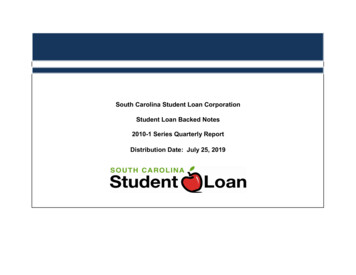
![[Page 1 – front cover] [Show cover CLEAN GET- AWAY 978-1 .](/img/13/9781984892973-6648.jpg)

